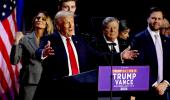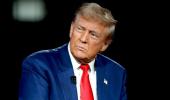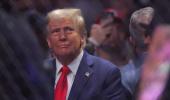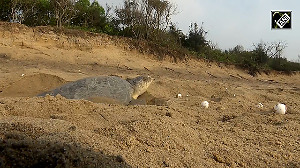It would be a challenge to India's policy makers how to deal with Trump so that mutual economic growth remains sustained and mutual understanding on global issues are not hampered, observes Dr Rajaram Panda.

Donald Trump was making news even before assuming the presidency. This is not surprising because he is known for his mercurial and unpredictable stances on many global as well as bilateral issues.
Trump has already indicated that he will revisit many international agreements he says are not serving America's interests.
He has also threatened to increase tariffs in imports from many countries that are against America's economic interests.
Such tough decisions could damage America's relations with its trading partners. But that is Trump for the world to understand and learn to deal with.
Even before taking office on January 20, Trump threatened to seize the Panama Canal, revived calls to buy Greenland and even spoke about annexing Canada.
Experts believe Trump's rhetoric could be a 'message' for China, which has increased its influence in Latin America and the Arctic.
By such pronouncements, Trump even before returning to the Oval Office challenged the sovereignty of some of America's closest allies, thereby underscoring his credentials as a global disrupter-in-chief.
Analysts have begun to interpret that Trump would be harsher on America's friends than on adversaries like Russia and China.
Greenland issue
Trump has floated the idea of the US buying the vast strategic island Greenland, a Danish territory, which he also had stated during his first term in office.
He repeated the idea when naming PayPal Co-Founder Ken Howery as his ambassador to the kingdom of Denmark and said, 'Ownership and control of Greenland is an absolute necessity' for US national security.
Greenland Prime Minister Mute Egede said the resource-rich island was 'not for sale'.
Trump's proposal to buy Greenland in 2019 had triggered tensions between the US and Denmark.
Then Denmark prime minister Mette Frederiksen had described Trump's proposal as absurd and made it clear that Greenland was not for sale.
There are mercantile considerations, of course, behind Trump's temptation to grab Greenland which has plenty of copper.
In any such land transaction, the consent of the people is a must. With a positive intent, such transactions could make the world more prosperous and habitable for humanity.

There are several critical raw materials Europe needs for its industries. In 2023, the European Union signed an MoU with Greenland to develop sustainable raw materials value chains. Greenland also has large deposits of rare earth metals key to the production of energy transition tech and batteries. Trump is clearly eyeing these.
At this point Denmark is not willing to make a sale. But it is not like Greenland has been theirs from time immemorial.
European invaders occupied many parts of the world and claimed as their own over time.
Likewise, when Tsar Alexander II of Russia sold Alaska to the US, the uncivilised tribes were handed over as objects.
Similarly when Napoleon sold Louisiana, he was not concerned about the local population either. But such issues are perceived and seen differently in modern times.
Trump can have his way if the majority of Greenland's population -- of which 96 per cent are Inuit -- endorse such an idea. Such a transaction would be perfectly legitimate in international law.
Here, there is some similarity in what Chinese President Xi Jinping has been pursuing and what Trump intends to do.
In principle, both men are expansionists. While Xi has been doing so in total disregard of international law and under threat of the use of force, Trump wants to pursue his proposals through diplomacy.
Even before assuming the presidency, Trump sent his eldest son Donald Trump Jr to Greenland to sell the idea of Greenland being a part of the US. But the people of Greenland scoffed at the proposal. 'Greenland is not for sale and will never be for sale,' they declared.
While Xi's long term goal is to restore China's status of what it was once the Middle Kingdom, Trump seeks a 'Greater America' in his pursuit of 'Make America Great Again' goal.
MAGA is a geographical and cartographic entity that began to take shape after Trump urged Canada to merge with the US and renewed the idea of buying Greenland from Denmark.

The incident, known as Martyr's Day in Panama, played a significant role in leading to the signing of the Torrijos-Carter Treaties in 1977. Photograph: Aris Martinez/Reuters
Panama Canal Issue
In his inaugural speech on Monday, January 20, 2025, Trump spoke about unfair fees for US ships passing through the Panama Canal and threatened that the US would take bacl control of the Panama Canal.
When Jimmy Carter was US president, he and Omar Torrijos, the then leader of Panama, had signed a treaty obliging the US to surrender control of the Panama Canal by 1999, settling a longstanding point of friction between the two countries.
Carter saw the move as an overdue show of American resolve to deal with the developing nations of the world on the basis of mutual respect and partnership.
Conservatives denounced the treatY as a giveaway. Gallup then noted that 78 per cent of Americans opposed the treaty.
The Panama Canal was built by the United States in 1914 to link the Atlantic and Pacific Oceans. It was returned to Panama under a 1977 deal.
Is Trump's comment on buying Greenland a subtle message to China, presently America's biggest adversary.
This is because Trump feels that Beijing has been incrementally spreading its influence in Panama.
Trump is equally concerned about China's growing presence in the Arctic and China's growing ties with Russia.
Trump may be sending a message to Denmark not to be too cosy with China. However, any US plan to 'buy' Greenland would be unfeasible not just in international law but more broadly in the global order that the US has been trying to uphold.
Trump has not ruled out military or economic action as part of his avowed desire to have the US take back control of the Panama Canal and acquire the Danish territory of Greenland.

Renaming Gulf of Mexico
Trump's expansionist pitch does not stop with Greenland and the Panama Canal. n Monday, he announced that he would rename the Gulf of Mexico as the Gulf of America.
Trump forgets that naming the sea Gulf of Mexico predates the formation of the United States of America.
The Times of India rightly editorialised: 'Grandstanding that borders on the comic has been a part of Trump's disruptive style aimed at unsettling political rivals.'
'This seemingly isolationist policy now seems to be making way for American exceptionalism and expansionism that threatens to redraw boundaries,' the newspaper noted.
Trump's second term will be disruptive for the world in many ways.

Future of Ties with India
During the Biden administration, the India-US relationship grew strong on many fronts, including strategic, defence and economy.
There are fears that some of these ties will be undermined during the Trump 2.0 presidency as Trump has threatened reciprocal tariffs with many countries, including India, with which the US has a trade disadvantage. Trump has called India's tariffs 'very high'.
Broadly, Trump has hinted that US policy during his second term would be isolationistic.
Optimists say that the India-US relationship built over the past 25 years is now a cornerstone of both nations' foreign policy agenda.
The breadth of cooperation spans defence, trade, energy, technology, education, and counterterrorism.
This is not to say that trade and tariffs could pose an immediate challenge under Trump's renewed leadership.
Trump has been critical of what he perceives as imbalances in trade with India, particularly India's high tariffs and the trade deficit.
This was a priority during Trump's first term and will likely dominate the agenda in the early days of the second term.
For Trump, addressing the tariff issue not only with India but with other trading partners with which the US has an imbalance of trade is a priority. He seeks a level of reciprocity.
Trump is likely to focus on sectors like energy, where US exports could meet India's rising demand, and services, where greater collaboration could enhance trade relations.
It would be a challenge to India's policy makers how to deal with Trump and his negotiators so that mutual economic growth remains sustained and mutual understanding on global issues are not hampered.
Dr Rajaram Panda is former Senior Fellow at Pradhanmantri Memorial Museum and Library, and MP-IDSA, New Delhi. He is also former ICCR Chair Professor at Reitaku University, Japan.
Feature Presentation: Rajesh Alva/Rediff.com











 © 2025
© 2025